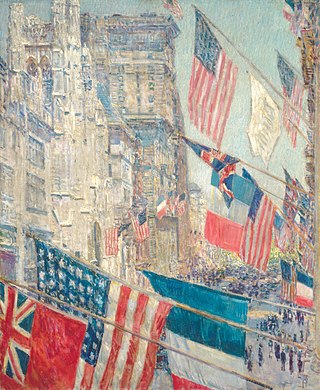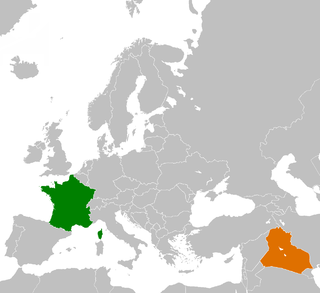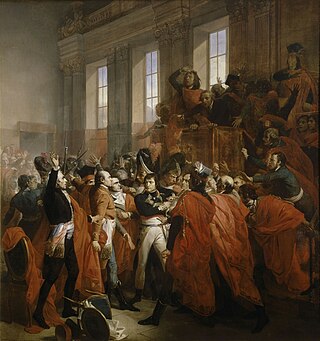Related Research Articles

An alliance is a relationship among people, groups, or states that have joined together for mutual benefit or to achieve some common purpose, whether or not explicit agreement has been worked out among them. Members of an alliance are called allies. Alliances form in many settings, including political alliances, military alliances, and business alliances. When the term is used in the context of war or armed struggle, such associations may also be called allied powers, especially when discussing World War I or World War II.
A coalition is formed when two or more people or groups temporarily work together to achieve a common goal. The term is most frequently used to denote a formation of power in political or economical spaces.

A military alliance is a formal agreement between nations concerning national security. Nations in a military alliance agree to active participation and contribution to the defense of others in the alliance in the event of a crisis. In the event a nation is attacked, members of the alliance are often obligated to come to their defense regardless if attacked directly. In the aftermath of the Second World War military alliances usually behave less aggressively and act more as a deterrent.

A proxy war is an armed conflict between two states or non-state actors, one or both of which act at the instigation or on behalf of other parties that are not directly involved in the hostilities. In order for a conflict to be considered a proxy war, there must be a direct, long-term relationship between external actors and the belligerents involved. The aforementioned relationship usually takes the form of funding, military training, arms, or other forms of material assistance which assist a belligerent party in sustaining its war effort.
An insurgency is a violent, armed rebellion against authority waged by small, lightly armed bands who practice guerrilla warfare from primarily rural base areas. The key descriptive feature of insurgency is its asymmetric nature: small irregular forces face a large, well-equipped, regular military force state adversary. Due to this asymmetry, insurgents avoid large-scale direct battles, opting instead to blend in with the civilian population where they gradually expand territorial control and military forces. Insurgency frequently hinges on control of and collaboration with local populations.

The Rwandan Patriotic Front is the ruling political party in Rwanda. Led by President Paul Kagame, the party has governed the country since its armed wing defeated government forces, winning the Rwandan Civil War in 1994.

Deterrence theory refers to the scholarship and practice of how threats or limited force by one party can convince another party to refrain from initiating some other course of action. The topic gained increased prominence as a military strategy during the Cold War with regard to the use of nuclear weapons and is related to but distinct from the concept of mutual assured destruction, according to which a full-scale nuclear attack on a power with second-strike capability would devastate both parties. The central problem of deterrence revolves around how to credibly threaten military action or nuclear punishment on the adversary despite its costs to the deterrer.
Decapitation is a military strategy aimed at removing the leadership or command and control of a hostile government or group. The strategy of shattering or defeating an enemy by eliminating its military and political leadership has long been utilized in warfare.

Counterinsurgency (COIN) is "the totality of actions aimed at defeating irregular forces". The Oxford English Dictionary defines counterinsurgency as any "military or political action taken against the activities of guerrillas or revolutionaries" and can be considered war by a state against a non-state adversary. Insurgency and counterinsurgency campaigns have been waged since ancient history. However, modern thinking on counterinsurgency was developed during decolonization. Within the military sciences, counterinsurgency is one of the main operational approaches of irregular warfare.

The Komala Party of Iranian Kurdistan, commonly shortened to Komalah, is a social-democratic ethnic party of Kurds in Iran. Formerly with Marxist-Leninist and communist ties, the Komalah is a well established party with a history of more than five decades. The Komala party's headquarters are presently in the Kurdistan Region of Iraq. They have an armed wing that has a history of leading the Kurdish resistance. The Komalah advocates for anti-imperialism and Kurdish self-determination.
The Battle of Talikota was a watershed battle fought between the Vijayanagara Empire and an alliance of the Deccan sultanates. The battle resulted in the defeat of Aliya Rama Raya which led to the eventual collapse of the polity and reconfigured Deccan politics.

Unrestricted Warfare: Two Air Force Senior Colonels on Scenarios for War and the Operational Art in an Era of Globalization is a book on military strategy written in 1999 by two colonels in the People's Liberation Army (PLA), Qiao Liang (乔良) and Wang Xiangsui (王湘穗). Its primary concern is how a nation such as China can defeat a technologically superior opponent through a variety of means. Rather than focusing on direct military confrontation, this book instead examines a variety of other means such as political warfare. Such means include using legal tools and economic means as leverage over one's opponent and circumvent the need for direct military action.

The Navy of the Islamic Revolutionary Guard Corps is the naval warfare service of the Islamic Revolutionary Guard Corps founded in 1985, and one of the two maritime forces of Iran, parallel to the conventional Islamic Republic of Iran Navy. The IRGC has been designated as a terrorist organization by the governments of Bahrain, Saudi Arabia and the United States. IRGC's Navy has steadily improved its capabilities to support unconventional warfare and defend Iran's offshore facilities, coastlines, and islands in the Persian Gulf.

French–Iraq relations are the relations between France and Iraq. France played a major role in Iraqi secession from the Ottoman Empire and eventual freedom from British colonial status. The Franco-Iraqi relationship is often defined by conflict and peace, with France supporting Iraq during the Iran-Iraq War, supporting intervention in Iraq in Operation Desert Storm, and opposing the 2003 US Invasion of Iraq. As of 2004, Iraq maintains an embassy in Paris and France maintains an embassy in Baghdad.

Study of the environmental impact of war focuses on the modernization of warfare and its increasing effects on the environment. Scorched earth methods have been used for much of recorded history. However, the methods of modern warfare cause far greater devastation on the environment. The progression of warfare from chemical weapons to nuclear weapons has increasingly created stress on ecosystems and the environment. Specific examples of the environmental impact of war include World War I, World War II, the Vietnam War, the Rwandan Civil War, the Kosovo War and the Gulf War.

The Red Shirts are a political movement in Thailand, formed following the 2006 coup d'état which deposed then-Prime Minister Thaksin Shinawatra. Originally synonymous with the United Front for Democracy Against Dictatorship (UDD), a group formed to protest the coup and resulting military government, the movement subsequently expanded to include various groups with diverse political priorities. Its members range from left-wing and/or liberal activists and academics to the large number of Thaksin's rural and working-class supporters. The movement emerged as the result of socioeconomic changes in Northeast Thailand in the 1990s and 2000s, including a growing middle class, rising aspirations, and an increasing awareness of the extreme inequality and of the fundamentally weak democracy in Thailand, typified by Thailand's primate city problem. Red Shirts group dynamics center on frustrated economic and political aspirations to improve democracy and overcome inequality, which contributed to the 2009 Thai political unrest and the 2010 Thai political protests, as well as shared suffering at the hand of the ruling class hegemony. As with other minorities, the Red Shirts have been dehumanized and demonized, with insults such as "Red Buffalo", since reclaimed by some of its targets. Their claims for transitional justice following the 2010 Thai military crackdown have been subverted by the Thai state.

A coup d'état, also known as a coup or overthrow, is a seizure and removal of a government and its powers. Typically, it is an illegal seizure of power by a political faction, politician, cult, rebel group, military, or a dictator. Many scholars consider a coup successful when the usurpers seize and hold power for at least seven days.
Hybrid warfare is a theory of military strategy, first proposed by Frank Hoffman, which employs political warfare and blends conventional warfare, irregular warfare, and cyberwarfare with other influencing methods, such as fake news, diplomacy, lawfare and foreign electoral intervention. By combining kinetic operations with subversive efforts, the aggressor intends to avoid attribution or retribution. The concept of hybrid warfare has been criticized by a number of academics and practitioners due to its alleged vagueness, its disputed constitutive elements, and its alleged historical distortions.

The Iran–Saudi Arabia proxy conflict, sometimes also referred to as the Middle Eastern Cold War, is the ongoing struggle for influence in the Middle East and other Muslim regions between Iran and Saudi Arabia. The two countries have provided varying degrees of support to opposing sides in nearby conflicts, including the civil wars in Syria and Yemen; and disputes in Bahrain, Lebanon, Qatar, and Iraq. It also extends to disputes or broader competition in other regions such as Nigeria, Pakistan, Afghanistan and other parts of North and East Africa, South Asia, Central Asia, Southeast Asia, the Balkans, and the Caucasus.
New generation warfare or NGW is a Russian theory of unconventional warfare which prioritizes the psychological and people-centered aspects over traditional military concerns, and emphasizes a phased approach of non-military influence such that armed conflict, if it arises, is much less costly in human or economic terms for the aggressor than it otherwise would be. It was first enunciated in 2013 by Valery Gerasimov as part of his Gerasimov Doctrine.
References
- ↑ Weitsman, Patricia A. (2010). "Wartime Alliances versus Coalition Warfare: How Institutional Structure Matters in the Multilateral Prosecution of Wars". Strategic Studies Quarterly. 4 (2): 113–138. ISSN 1936-1815. JSTOR 26269800.
- ↑ O’Connor, Steven; Piketty, Guillaume (2020). "Introduction – Foreign fighters and multinational armies: from civil conflicts to coalition wars, 1848–2015" (PDF). European Review of History: Revue européenne d'histoire. 27 (1–2): 1–11. doi:10.1080/13507486.2019.1709048. S2CID 216204960.
- ↑ Terraine, John (June 1989). "Lessons of coalition war: 1914 and 1939". The RUSI Journal. 134 (2): 57–62. doi:10.1080/03071848908445368.
- ↑ Schmitt, Olivier (2018). Allies that Count: Junior Partners in Coalition Warfare. Georgetown University Press. ISBN 978-1-62616-547-2.
- ↑ Treverton, Gregory F. (10 April 2019). "Ending Major Coalition Wars". Conflict Termination and Military Strategy. Routledge. pp. 89–108. doi:10.4324/9780429041495-6. ISBN 978-0-429-04149-5. S2CID 198021110.